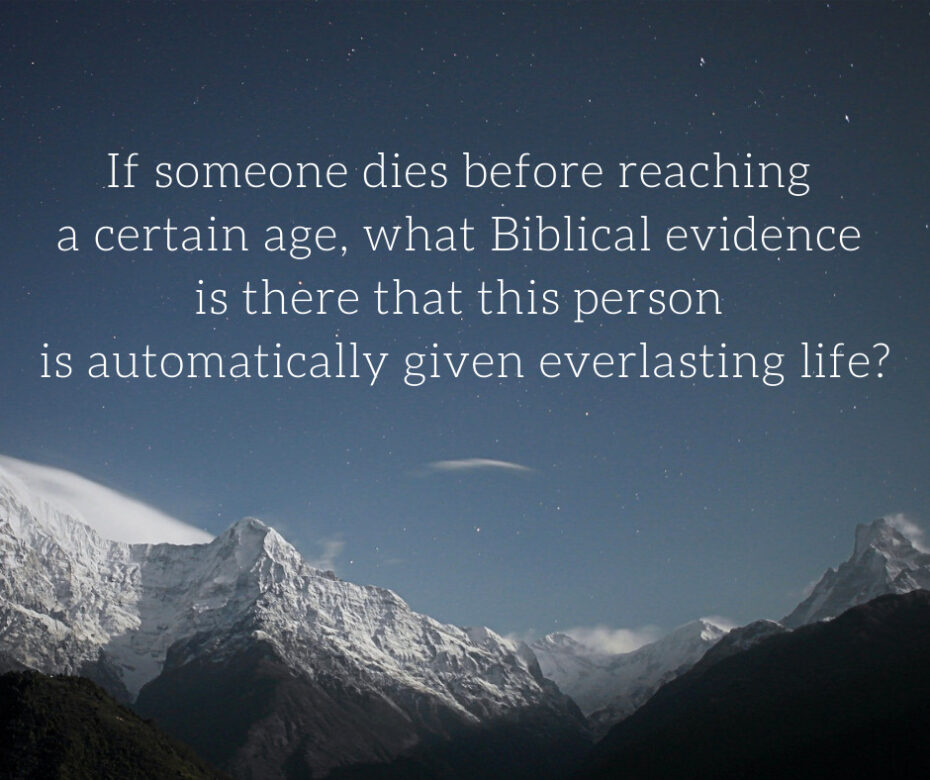Martin asks a question that deals with the Rapture but also applies to the gift of everlasting life:
The age of accountability is always mentioned when dealing with the death of a child or someone with mental disabilities. In 1 Thess 4:17, does the harpazō [catching up, i.e., the Rapture] include those who have not reached the age of accountability?
First, does the Bible teach that there is an age of accountability? Yes, it does. The clearest example is found when the new nation of Israel sent in a dozen spies when they were at Kadesh Barnea. Because they listened to the ten unbelieving spies, everyone twenty and over died over the next thirty-eight years, except for the two believing spies, Joshua and Caleb (Numbers 14:29ff.). None of those people were allowed into the Promised Land.
All those under age twenty got to go into the Promised Land. That is telling.
There is no other text that gives us an age of accountability. I think it is twenty. But it could be thirteen or ten or it might vary from child to child. Many think it is the age at which a child can distinguish between fantasy and reality. But remember Kadesh Barnea.
Second, there is a general principle in the Bible that God does not hold people accountable for that which they are unable to do. So, we know that small babies and infants who die will not be eternally condemned. However, the principle from Kadesh Barnea is that God is much more gracious than that. Most likely even teens who die before coming to faith in Christ will not be eternally condemned. (I know some of you are gasping at this point. How could God be that gracious? Well, He was at Kadesh Barnea. But we do not have a clear statement other than that, so maybe the age of accountability is younger than that.)
Third, another principle of Scripture is that only those who believe in Jesus gain everlasting life (e.g., John 3:16; 5:39-40). Therefore, I would say that anyone who dies before the age of accountability (or people who never gained the mental capacity to believe) will not simply be given everlasting life. Possibly God makes an exception in their case since He would not condemn those unable to believe. But I think there is a more likely solution.
Fourth, we know from Scripture that many people died and then were raised from the dead and in some cases lived for years after that. There are at least three recorded incidents of people that Jesus raised from the dead who lived again in natural bodies, and one of them was a pre-teen (Jairus’s daughter was twelve years old). Quite possibly Jairus’s daughter or the widow of Nain’s son were unbelievers. An unbeliever given more time to live is given more time to come to faith and be born again.
I think that tens or hundreds of millions of people will be raised at the start of the Millennium in natural bodies. They will be given a chance to live out their natural lives and to come to faith in Christ. What a great time to come to faith, when Jesus is physically present on earth and ruling! Those who come to faith will gain everlasting life. Of course, I may be wrong. Maybe God simply gives them all everlasting life and glorified bodies (or everlasting life and natural bodies). But I think it more likely that they will be given the opportunity to come to faith in Christ, be born again, and then lay up eternal treasure.
Fifth and finally, the same principle applies to the Rapture. We have examples from the OT of children who were delivered from tribulation with their parents. I am thinking of Noah’s three sons and daughters–in–law and Lot’s daughters. That suggests God will do the same with the children of believers at the Rapture. It is inconceivable to me that God would orphan the children of believers to go through the Tribulation without their parents.
Of course, in my view they do not gain everlasting life at that time. If they are believing children, then they already have it. But if they are not yet believers, then I suggest that they will be with their parents for seven years (which likely will seem like seven minutes) and then will go into the Millennium with natural bodies. If they come to faith in Christ during the Millennium, they will gain everlasting life.
I realize that there is a lot of speculation in my answer. That is because the Scriptures do not come right out and say, This is what happens to children who die before age twenty or This is what happens to children under age twenty when their believing parents are raptured. We have to speculate based on principles established in Scripture.
Martin, I hope you find that helpful.


